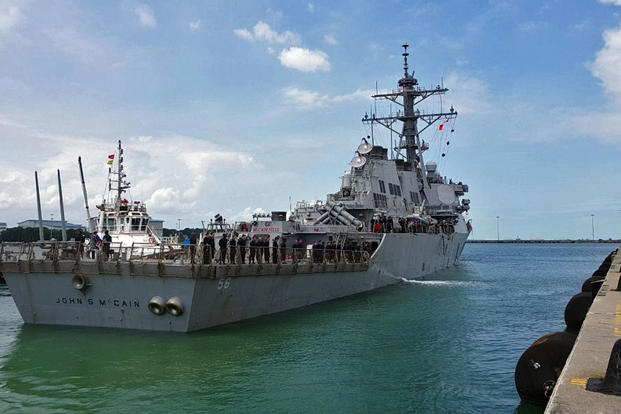The nation is reeling after a second Navy destroyer sustained major damage in a collision with another ship in the span of three months, and theories abound about what caused the most recent incident early Monday morning.
But the chief of Naval Operations told reporters at the Pentagon on Monday that, in the case of the collision of the USS John S. McCain with a Liberian-flagged merchant ship, there was so far no evidence that external or unfriendly forces played a role.
"That's certainly something we are giving full consideration to, but we have no indication that that's the case yet," Adm. John Richardson said. "But we're looking at every possibility, so we're not leaving anything to chance."
Richardson said a wide-ranging investigation into the incident would also consider the possibility of cyber attacks.
But in the meantime, the Navy is moving ahead with an aggressive review of its own practices, procedures and training to determine whether organizational failures contributed to the crash at sea. Earlier today, Richardson announced that all Navy fleets across the globe would observe an operational pause to assess procedures and areas for improvement.
Related content:
- 10 Sailors Missing, 5 Injured After Destroyer Collides with Tanker
- CNO Orders Operational Pause, Review After Latest Ship Collision
- US Navy Ship Collides With South Korean Fishing Boat
In June, seven sailors were killed when the destroyer USS Fitzgerald collided with a Philippine-flagged container ship southwest of Tokyo. Earlier this year, in separate high-profile incidents the guided-missile cruiser USS Lake Champlain collided with a Korean fishing vessel and the cruiser USS Antietam ran aground in Tokyo Bay.
In his brief to reporters, he offered more details, saying fleet commanders would have a week to put together individual region-specific plans for how to observe the halt in operations. Each operational pause will likely last one to two days, Richardson said, though commanders will have broad latitude to determine the specifics.
"My hope is that we will learn, continue to improve in the short term, validating that we are sound on the fundamentals," Richardson said. "And if not, we will take action to correct that, and then we'll look at broader, more systemic issues."
An additional aggressive and wide-ranging review of safety, training and current Navy practices will focus on identifying trends that could contribute to the series of recent high-profile mishaps involving ships in the Pacific.
"This will be a broader effort looking at a number of things, one being, what is the situation out in Japan with our forward-deployed naval forces out there, how are they executing their business," Richardson said. "I just want to understand that more deeply in terms of training, generating that readiness that we ask them to achieve, and then certifying that readiness, making sure that it meets standards."
While Richardson said he hasn't set a deadline for the completion of this review, he said it would be finished in roughly a few months, enabling the Navy to take any necessary corrective actions as quickly as possible.
These steps come as lawmakers express dismay at the series of mishaps and call for oversight. In a statement, House Armed Services Committee Chairman Rep. Mac Thornberry, a Republican from Texas, called on Congress to provide any additional support that the Navy might need.
"We ask a lot of our men and women in the Navy. The time they spend at sea is increasing, while their ships age and their funding gets cut," he said. "These are just the conditions that can lead to an increase in the kinds of accidents we are witnessing.
The congressman added, "Congress has a duty to provide our Sailors with the additional resources they so clearly need, and to do so immediately. To do any less, while these Sailors are doing so much for us, would be immoral."
Sen. John McCain, chairman of the Senate Armed Services Committee and a Navy veteran -- for whose father and grandfather the USS McCain is named -- voiced his support for the Navy's decision to execute an operational pause.
"I agree with Admiral Richardson that more forceful action is urgently needed to identify and correct the causes of the recent ship collisions," the Arizona Republican said. "Our sailors who risk their lives every day, in combat and in training, deserve no less. I expect full transparency and accountability from the Navy leaders as they conduct the associated investigations and reviews."
Meanwhile, search-and-rescue efforts continue for 10 sailors who still remain missing 24 hours after the McCain collision, which took place east of the Straits of Malacca and Singapore around 6:24 a.m. local time Monday. Officials with the Navy's 7th fleet said four sailors were medically evacuated from the ship with relatively minor injuries, and a fifth was injured but did not require additional medical attention.
The ship arrived at Changi Naval base in Singapore under its own power hours after the collision. Photos of the McCain show significant damage to the hull on the port side, and officials said some crew berthing as well as machinery and communications rooms were flooded as a result.
The effort to recover the missing sailors includes ships and aircraft from the Royal Malaysian Navy and Republic of Singapore Navy, as well as aid from the amphibious assault ship USS America, which is also providing berthing and food for displaced McCain sailors.
-- Hope Hodge Seck can be reached at hope.seck@military.com. Follow her on Twitter at @HopeSeck.






























